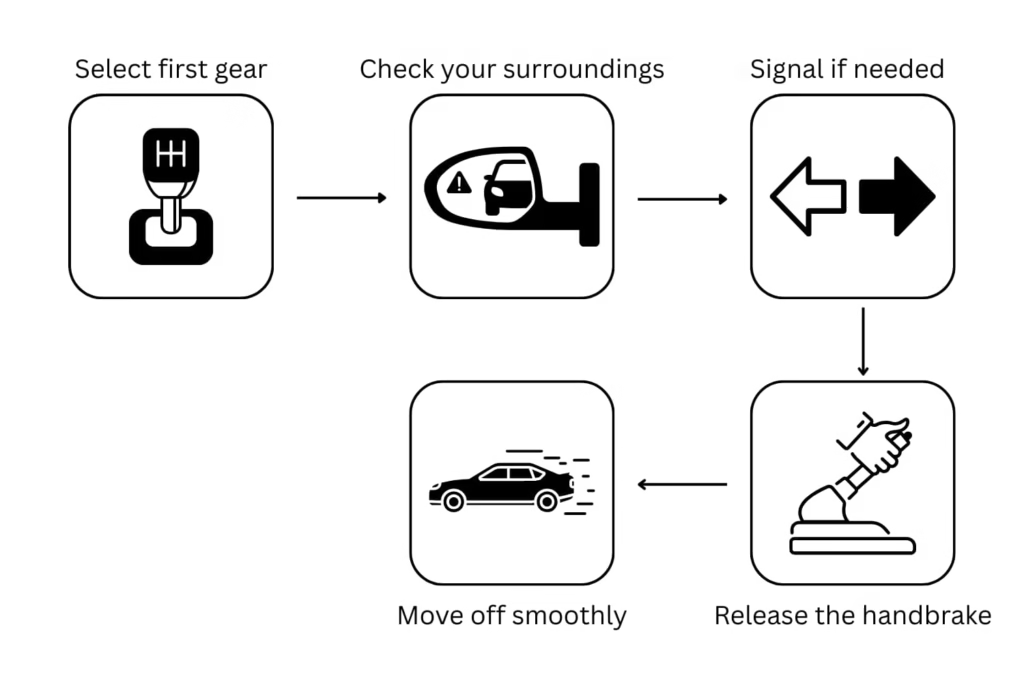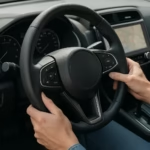Learning to drive is exciting, but it can also feel a little overwhelming in the beginning. One of the most important skills every learner driver must master is how to move off and stop safely. These are the first and last actions of almost every journey, and doing them correctly shows that you are a safe, responsible driver.
In this guide, we will walk you step by step through the process of moving off smoothly and stopping safely. We’ll cover manual car basics, give you practical tips to avoid stalling, and highlight common mistakes learners make. By the end, you will feel more confident every time you start and stop your car.
Why Moving Off and Stopping Matters
When you move off, you’re joining other traffic on the road. This means you must do it carefully so that you don’t surprise or endanger other road users. Stopping safely is just as important — whether you’re pulling up at the side of the road, stopping at traffic lights, or parking at the end of a trip.
Examiners pay close attention to these actions during a driving test, so practicing them is key to passing. But more importantly, these skills will make you a safer driver in real life.
How to Move Off Safely (Manual Car)
Prepare the car
Press the clutch fully down.
Select first gear.
Set the gas (slight acceleration, around 1500 revs).
Slowly raise the clutch until you feel the bite point.
Check your surroundings
Look in your interior mirror.
Check your side mirrors.
Look over your blind spot (usually the right shoulder in right-hand traffic).
Signal if needed
If other road users will benefit, use your indicator.
If the road is empty, signaling isn’t always necessary.
Move off smoothly
Release the handbrake.
Balance the clutch and accelerator to avoid stalling.
Steer gently to join the road.
Build up speed
Press the accelerator more firmly.
Gradually release the clutch fully.
Change to second gear once the car is moving smoothly.

How to Stop Safely
Check mirrors first
Look in your interior and side mirrors.
Make sure it’s safe to slow down.
Choose a safe stopping place
Avoid parking near junctions, bends, or bus stops.
Pick a spot where you won’t block traffic.
Slow down smoothly
Ease off the accelerator.
Press the brake gently at first, then more firmly if needed.
Clutch down before stopping
Just before the car stalls, press the clutch fully down.
Keep braking until the car comes to a complete stop.
Secure the car
Put the gear stick into neutral.
Apply the handbrake.
Release the pedals.
Tips to Avoid Stalling When Moving Off
Practice finding the bite point before joining traffic.
Give a little more gas if the car feels like it might stall.
Relax your hands and don’t rush the pedals.
If you stall, don’t panic — secure the car, restart calmly, and try again.
Common Mistakes Learners Make
Forgetting blind spot checks – This can be dangerous and may cause test failure.
Releasing the clutch too fast – This often leads to stalling.
Stopping in unsafe places – Always think about other road users.
Not securing the car – Failing to apply the handbrake on a slope could make the car roll.
Practicing With a Driving Instructor
Although you can practice with a family member, learning how to move off and stop safely is much easier with a qualified instructor. They can teach you the correct order of steps, give real-time feedback, and help you prepare for the driving test.
Moving off and stopping are basic but vital driving skills. By following the correct steps, checking mirrors and blind spots, and practicing regularly, you’ll soon feel confident in traffic. Remember, being smooth and safe is far more important than being fast.
Mastering how to move off and stop safely will not only help you pass your test but also set you up for a lifetime of safe driving.
FAQ
Q1: What should I check before moving off?
Always do a mirror–signal–blind spot check. Make sure it’s safe, use your indicator if needed, and only move when the road is clear.
Q2: What should I do if the car stalls while moving off?
Stay calm. Press the clutch and brake, shift to neutral, restart the engine, and try again smoothly.
Q3: Should I signal every time I move off or stop?
Only signal if it helps other road users understand your intention — for example, when there are cars or pedestrians nearby.
Q4: Why is it important to check mirrors before stopping?
To make sure no vehicle is too close behind you and that it’s safe to slow down.
Q5: What’s the most common mistake beginners make?
Not checking blind spots or lifting the clutch too quickly, which can cause stalling or rolling backward.
Discover more from SMOOTHSTEERING
Subscribe to get the latest posts sent to your email.



